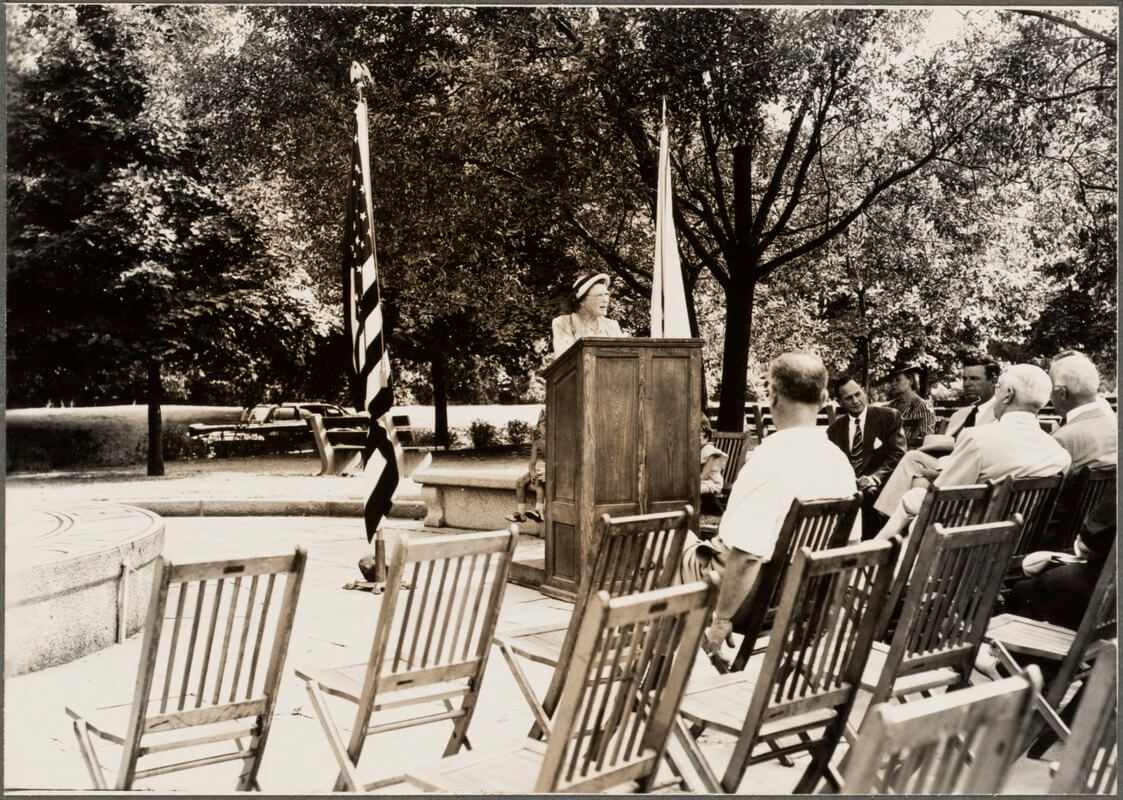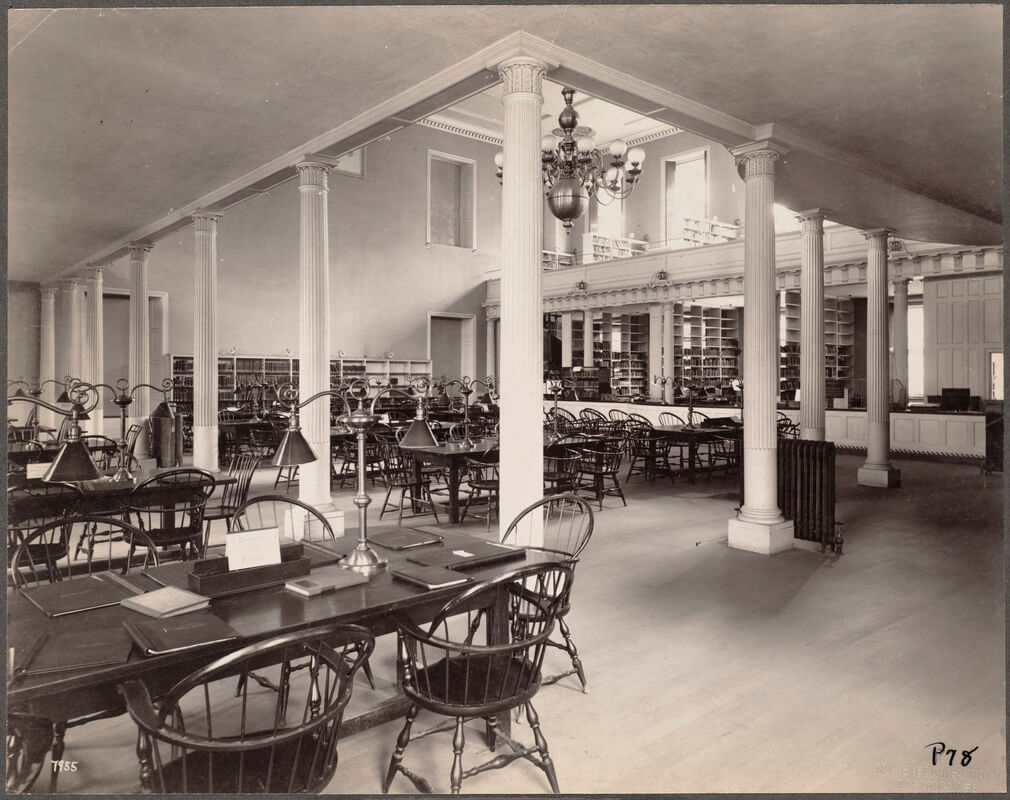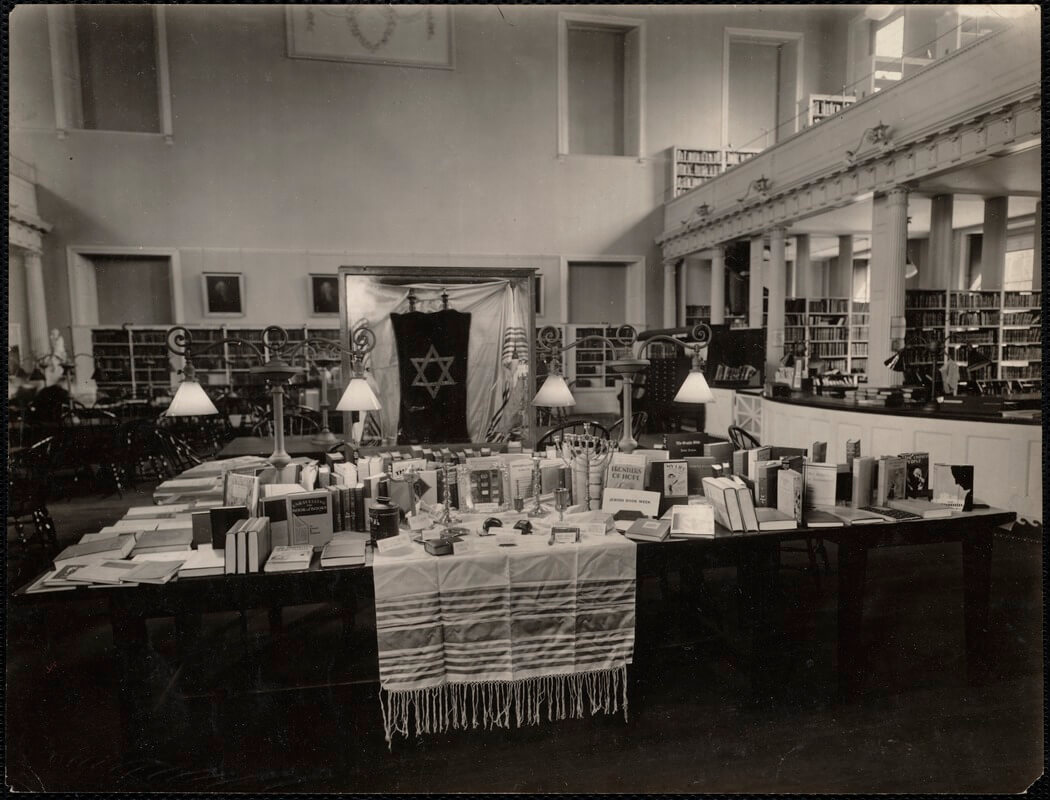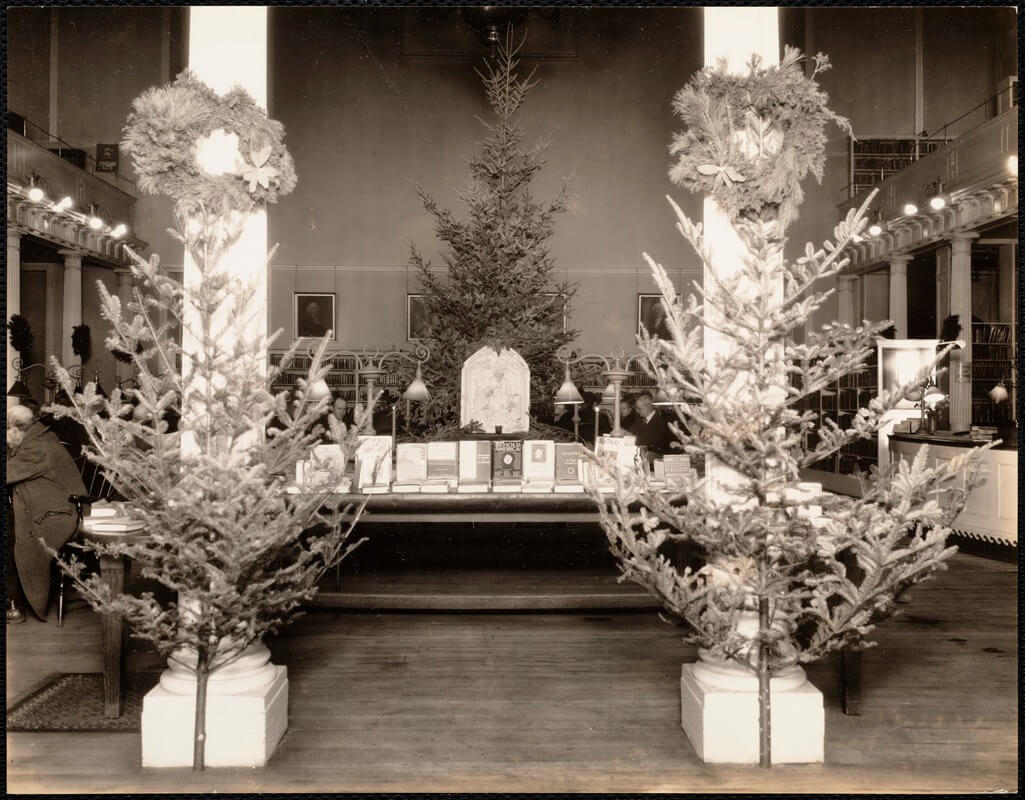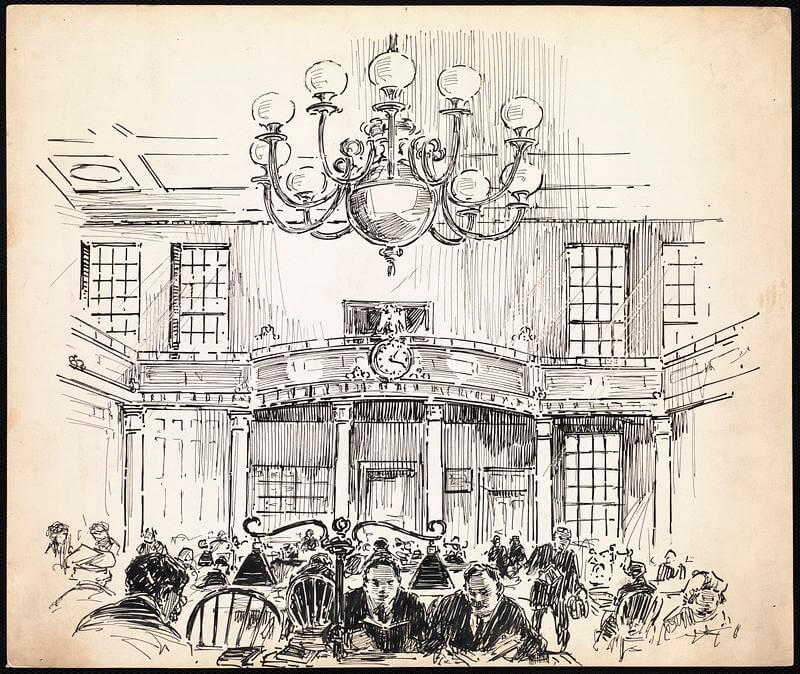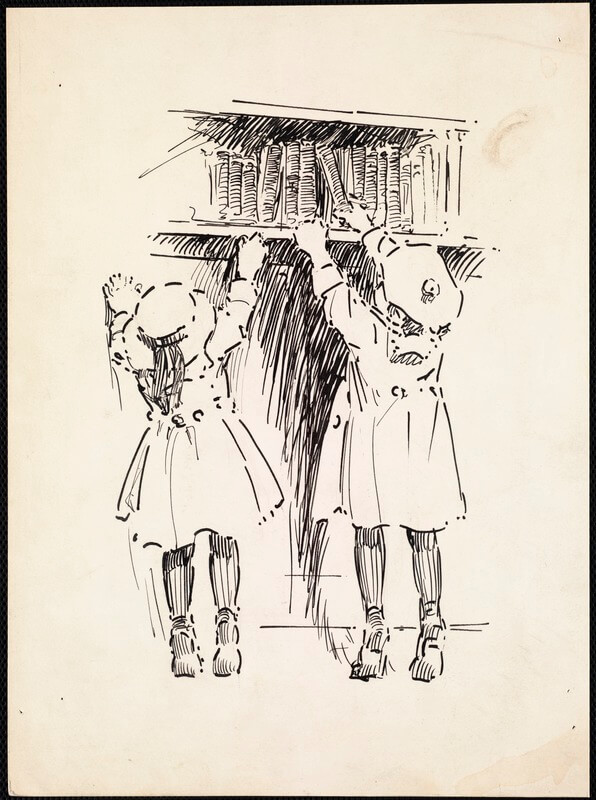Fanny Goldstein
Fanny Goldstein, as head librarian of the West End Branch library from 1919 to 1957, bridged the West End’s diverse communities through literary exhibits and events such as “Jewish Book Week.” Goldstein, who immigrated from Russia as a young child and resided on Joy Street, was a true West End community leader.
Fanny Goldstein was born on May 15, 1895 in Kamenets-Podolsk, Russia (in present-day Ukraine), the second-oldest child (out of five) for Bella and Phillip Goldstein. The Goldsteins immigrated to the North End in 1900, when that neighborhood had a large Eastern European Jewish population. In 1913, Goldstein was hired as an assistant librarian by Edith Guerrier, the head librarian at the North End Branch of the Boston Public Library. During that time, Goldstein edited the newsletter for the Saturday Evening Girls Club, headed by Guerrier and financially supported by Helen Osborne Storrow; the Club invited young immigrant girls to participate in discussions of books, politics, and culture, and to pursue art. The activities of the Saturday Evening Girls Club ensured, as Goldstein wrote, that “the doors of America literally opened up for” immigrant girls in Boston. Goldstein transferred to the Tyler Street Reading Room (the Chinatown branch of the BPL) in 1919, and she became head librarian of the West End Branch in 1922. Goldstein, living on Joy Street at the time, was paid $31 a week at the West End Branch.
When Goldstein joined the West End Branch, she became the first Jewish woman to direct a branch library in Massachusetts. Goldstein was simultaneously interested in giving immigrants the social and cultural knowledge to “Americanize,” and in celebrating the diversity of the West End’s racial, ethnic, and religious communities. According to the Globe, Goldstein particularly “took it upon herself to explain America to the Jews and to give the non-Jewish community an opportunity to learn about Jews and Judaism.” In 1925, Goldstein held a Jewish Book Week at the West End Branch with Goldstein’s own small collection of books by American Jewish authors. She was inspired by requests from social workers, and non-Jewish residents, who wanted to learn more about Judaism and Jewish traditions. Goldstein regularly promoted the concept of Jewish Book Week in the bulletins and conferences of the American Library Association, and her efforts inspired the national founding of Jewish Book Month in 1943. When the Nazis in Germany burned Jewish books in 1933, Goldstein spoke out against the Nazis in the Globe and displayed, at the West End Branch, a collection of many of the books the Nazis destroyed.
Goldstein held book weeks for other racial, ethnic, and religious groups as well, such as Catholic Book Week, and Negro History Week (in 1950). When West End Branch reference librarian George Washington Forbes, the first Black librarian hired by the Boston Public Library, passed away in 1927, Goldstein translated Forbes’ obituary from the Yiddish press and mailed it to W.E.B. Du Bois who republished it in The Crisis. The Globe reported in 1933 that because of Goldstein’s exhibits about all of the nationalities represented by the West End, “her library is eagerly sought by hundreds, they finding a medium of understanding between the cultures of the old and new worlds.” Though Goldstein’s specialty was “Judaica,” or collections of books by Jewish authors, Goldstein was equally interested in what she called “Westendica,” or books written by residents of the West End and Beacon Hill. In 1930, Goldstein collaborated with the Massachusetts Tercentenary Commission on a collection of Westendica to honor the neighborhood’s diverse histories. In addition to promoting diverse literature, Goldstein hosted interfaith holiday celebrations at the West End Branch library, such as a “unique joint Chanukah-Christmas party” in 1943. The predecessor to this party was Goldstein’s “Good Fellowship Party” which she initiated in 1928 for anyone who needed somewhere to stay during Christmas Eve, and the party ran every year until it was moved to a date between Hanukkah and Christmas.
The West End Branch, since its founding in 1896, was located on Cambridge and Lynde Streets in the building of the former Old West Church (built in 1737 and later re-built in 1806 because the original building was too small). The City acquired the church building in 1894, according to a city planning board report, “in response to a wide appeal that the people of the district [West End] might have the benefit of a branch library, and also that the building, which was then known as the old West Church, a really distinctive example of very early nineteenth century architecture, might be preserved.” On January 16, 1938, Goldstein gave a lecture at the Central Branch of BPL titled “The Old West Church of Boston: Its Historic and Dramatic Background” in honor of the Church’s 200th anniversary. In February 1946, when the West End Branch celebrated its fiftieth anniversary, Goldstein told the Globe of the significance she placed upon the fact that five ministers preceded the four librarians who came before her. Goldstein remarked, “My philosophy has been to preserve as much as possible the liberal teachings of the old ministers whose words colored the life of the church and its relation to the community. Since coming here, it has been my ambition to benefit from them and to carry on their aims and ambitions.” Goldstein’s office at the West End Branch was located in the ministers’ study, and she appreciated how the legacy of the Church (and the paintings which remained in her office, such as that of Rev. Jonathan Mayhew who participated in the American Revolution) conveyed the important ideal of “the brotherhood of man.”
Goldstein paid close attention to the reading trends of West Enders who visited the library. She found that in 1922, 67% of the books checked out were “juvenile books” and 33% were “adult books” (20% of which were fiction). Yet in 1946, following the end of World War II, adult books became 65% of those circulated and the proportion of fiction books declined. Goldstein attributed this shift, in the words of reporter Leo Shapiro, to the demand for “serious reading, especially for books on technical and vocational subjects…particularly on the part of the veteran seeking to better his position.” Because of Goldstein’s efforts, the quantity of books held by the West End Branch increased significantly, from 8,000 volumes in 1896 to about 20,000 by 1946
Goldstein announced her retirement at the West End Branch’s annual Christmas-Hanukkah party in 1957. The Globe reported the next day, on December 20, that “the West End changed a little last night.” Goldstein’s Judaica collection lived on at the Central Branch, as her thousands of Jewish books were purchased by David Weltman from the Jacob Ziskind Fund for Charitable Purposes, who then turned over the books to Sidney Rabb, vice president of the Board of Trustees of the BPL. Rabb announced the night of Goldstein’s retirement that her collection would be permanently housed at the Copley branch, just three years after Goldstein was appointed Judaica curator for the BPL in 1954. Goldstein’s Judaica collection became the second-largest in Massachusetts (Harvard’s collection then being the first). Goldstein died on December 26, 1961 after battling illness for a year, and she is remembered today for bridging diverse communities in the West End and Boston as a whole.
Article by Adam Tomasi
Source: Boston Women’s Heritage Trail; Boston Book Blog; Jewish Women’s Archive; ProQuest/Boston Globe (“What People Talk About,” October 29, 1947, page 16; “Fanny Goldstein,” December 27, 1961, page 18; “West End Branch Librarian, Fanny Goldstein, Retires,” December 20, 1957, page 15; “Librarian to Lecture on Old West Church,” January 13, 1938, page 14; “West End Library Observes 50th Anniversary in Old West Church,” February 11, 1946, page 9)


